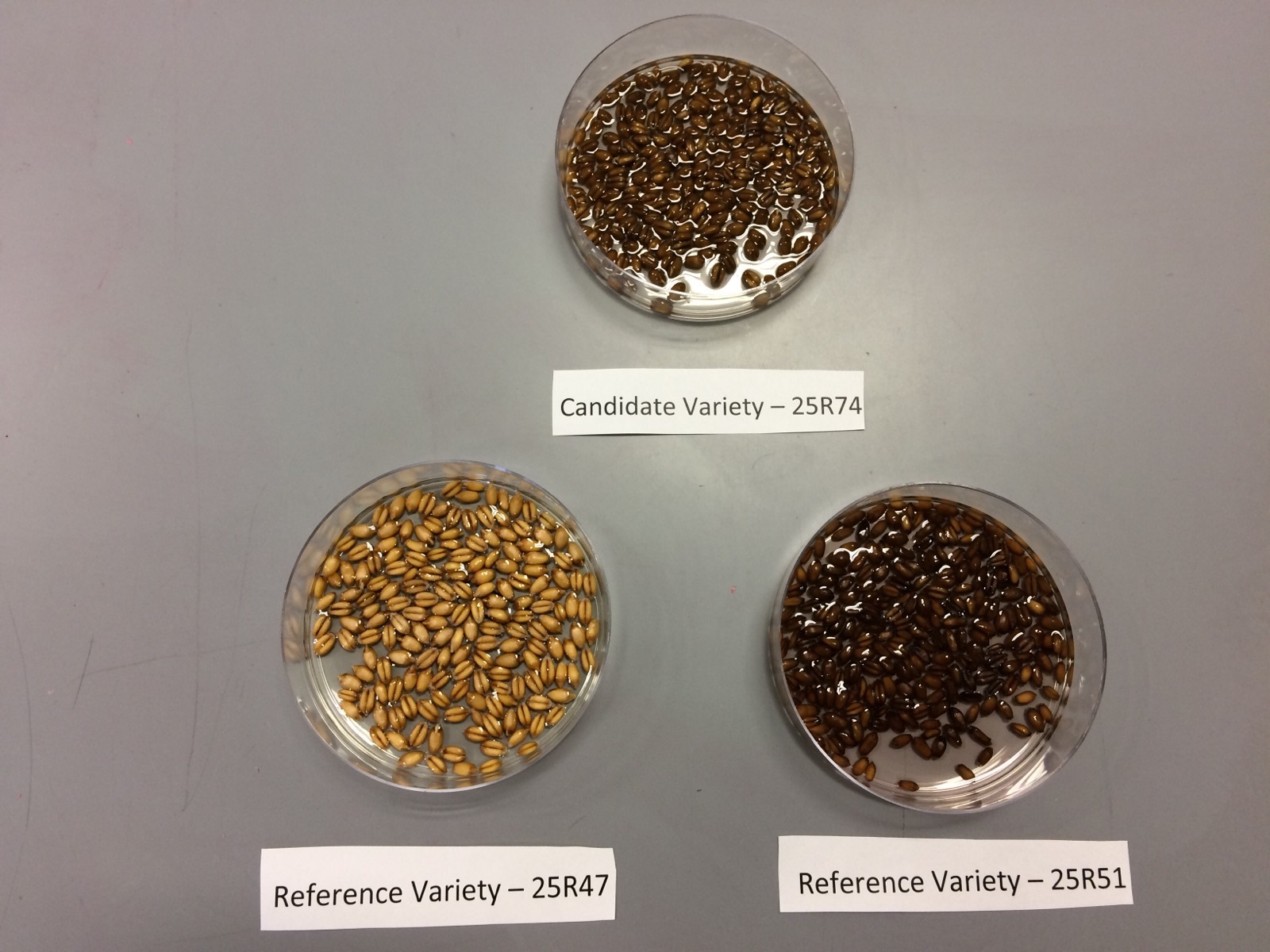25R74
| Denomination: | '25R74' |
|---|---|
| Previously Proposed Denomination: | 'XW14B' |
| Botanical Name: | Triticum aestivum |
| Applicant/Holder: |
Pioneer Hi-Bred International, Inc. 8305 NW, 62nd Avenue P.O. Box 7060 Johnston, Iowa 50131 United States of America |
| Breeder: |
William J. Laskar, Pioneer Hi-Bred International, Inc., Windfall, United States of America |
| Agent in Canada: |
Pioneer Hi-Bred Production Co. 240, 115 Quarry Park Road SE Calgary, Alberta T2C 5G9 Canada Tel: 403-440-2988 |
| Application Date: | 2016-05-05 |
| Provisional Protection:: | 2016-05-05 |
| Application Number: | 16-8915 |
| Grant of Rights Date: | 2018-05-30 |
| Certificate Number: | 5746 |
| Exemption from compulsory licensing: | Yes |
| Expiry date for exemption from compulsory licensing: | 2020-05-30 |
| Grant of Rights Termination Date: | 2038-05-30 |
Variety Description
Varieties used for comparison: '25R47' and '25R51'
Summary: The anthocyanin colouration on the coleoptile of '25R74' is of medium intensity whereas it is absent or very weak for that of '25R51'. The plants of '25R74' are shorter than the plants of '25R47'. The spike of '25R74' is shorter than the spike of '25R51'. The hairiness of the convex surface of the apical rachis segment of '25R74' is of medium density whereas it is sparse for '25R47'. The beak of the lower glume of '25R74' is very short to short whereas it is very long for '25R51'. The kernel of '25R74' has a dark colouration reaction to phenol whereas the colouration is light for '25R47' and medium for '25R51'.
Description:
PLANT: winter type, erect at 5 to 9 tiller stage, matures mid-season
SEEDLING (4 LEAF STAGE): medium intensity of anthocyanin colouration of the coleoptile, glabrous sheath and blade of lower leaves
FLAG LEAF: medium frequency of plants with recurved flag leaves, absent or very weak anthocyanin colouration of auricles, medium to strong glaucosity of sheath, glabrous blade and sheath
CULM : weak glaucosity, curved neck
STRAW: thin pith in cross-section, absent or very weak anthocyanin colouration at maturity
SPIKE: very weak to weak glaucosity at heading, tapering shape in profile, dense, white at maturity, erect to nodding attitude, medium hairiness of convex surface of apical rachis segment
AWNS: shorter than spike, white to light brown
LOWER GLUME: medium length and width, glabrous, sparse to medium extent of internal hair
LOWER GLUME SHOULDER: very narrow, sloping
LOWER GLUME BEAK: very short to short, slightly curved
LOWEST LEMMA: straight beak
KERNEL: soft red type, light red to medium red, medium sized, medium in length and width, oval to elliptic, rounded cheek, medium length of brush hairs, crease narrow and shallow, dark phenol colouration
GERM: medium sized, round
AGRONOMIC CHARACTERISTICS: poor to fair resistance to pre-harvest sprouting
PASTRY AND BISCUIT QUALITY: fair
DISEASE REACTIONS: resistant to Powdery mildew (Erysiphe graminis f. sp. tritici), resistant to moderately resistant to Stripe rust (Puccinia striiformis), moderately resistant to moderately susceptible to Fusarium head blight (Fusarium graminearum), moderately susceptible to Leaf rust (Puccinia triticina) and Septoria tritici blotch (Septoria tritici)
INSECT REACTION: resistant to Hessian Fly (Mayetiola destructor) Biotype E
Origin & Breeding History: '25R74' (experimental designation XW14B) is a soft red winter wheat developed by Pioneer Hi-Bred International, Inc. '25R74' was developed from the three parent cross '25R62'/'W980281V1'//'W000450F1B', made in 2006. The single cross, '25R62'/'W980281V1' was made during the 2006 spring greenhouse cycle and was designated 'W060445'. In 2006, the final cross was designated 'W070606'. In 2007, the F1 generation was planted into a field nursery with F2 to F4 bulk populations grown at two locations from 2008 to 2010. Heads were selected for plant health, height and maturity. F5 and F6 generations were were bulk grown in an Indiana greenhouse and selected for tolerance to Fusarium head blight. From 2012 to 2015, yield, agronomic performance and uniformity tests were conducted from the F7 to F10 generations. This variety was bred and developed using a pedigree selection method for disease resistance, plant type, height, head type, straw strength, maturity, grain yield, test weight, and milling and baking characteristics.
Tests & Trials: Trials for '25R74' were conducted during the 2015 and 2016 growing seasons in Caledon, Ontario. The candidate and two reference varieties were planted in three replicate blocks, the second and third blocks being randomized. Plots were 9 metres squared, 6 metres long, and included six rows 30 cm apart with 2600 seeds per plot. Observations were made throughout the season at appropriate times on the entire plot, and measurements were taken on 8 plants per plot, 24 plants total per variety.
Comparison tables for '25R74' with reference varieties '25R47' and '25R51'
Plant height, including awns at maturity (cm)
| '25R74' | '25R47' | '25R51' | |
|---|---|---|---|
| mean (2015) | 68.5 | 73.1 | 68.2 |
| std. deviation (2015) | 1.5 | 2.3 | 2.6 |
| mean (2016) | 72.1 | 81.0 | 83.5 |
| std. deviation (2016) | 1.4 | 2.2 | 0.5 |
Spike length, excluding awns (cm)
| '25R74' | '25R47' | '25R51' | |
|---|---|---|---|
| mean (2015) | 6.6 | 6.9 | 8.3 |
| std. deviation (2015) | 0.6 | 0.6 | 0.4 |
| mean (2016) | 7.6 | 7.5 | 8.6 |
| std. deviation (2016) | 0.2 | 0.2 | 0.3 |
Click on image for larger view

Wheat: '25R74' (top) with reference varieties '25R47' (bottom left) and '25R51' (bottom right)
- Date modified: